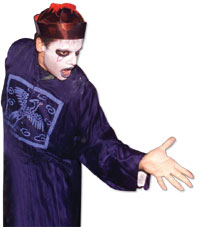Celebrating Halloween in a foreign land where it remains a Western oddity to many can be a challenge. It may not be easy to find a bright orange pumpkin for a jack-o-lantern, or the neighbors haven't stocked up on candy for trick-or-treating children. But delving into Chinese culture reveals a whole new cast of creepy characters, perfect for giving Halloween a Beijing makeover - and a very scary one, at that!
Dressing up as the Chinese vampire, or Jiang Shi, is just one way to take your Chinese friends' breath away. Literally "stiff corpse," Jiang Shi is known as "hopping corpse" or "Chinese vampire" by Westerners. Said to be created when a person's soul fails to leave the deceased's body, hopping corpses were popular subjects in 1980s Hong Kong movies, such as Mr Vampire.
Just as the West has Halloween for ghosts and ghouls, so does China have a holiday to fete the departed spirits of the underworld: Ghost Festival, a popular occasion celebrated on the 15th day of the seventh lunar month. Chinese legend says the gate to hell is opened at midnight, and ghosts swarm into the world of human beings in search of food and money. These ghosts, who have been starving for a year, will enter households if they cannot find enough delicacies in the street.
Therefore, activities at the festival include preparing ritualistic offerings of food, and burning hell money to please the visiting ghosts and spirits as well as deities and ancestors.
In contrast to Halloween, the Chinese ghost festival is very solemn, even frightening in some people's childhood memories. Most Chinese might not believe in God or evil, but they fear ghosts. They believe in the saying, "the ghost is the dead people's souls". During the ghost festival, Chinese people would try to avoid outdoor activities, get married or move to a new house-especially at night.
"They say if a ghost finds you in the street and follows you back home, your family will have bad luck all year," said Chen Qiuying, an advertising professional from Xiamen, Southeast China's Fujian Province. People should also not go near bodies of water on the day as it is believed ghosts who drowned themselves are eager to grab someone into the water so that they can come back to life.
"All in all, people should be very careful during the Chinese ghost festival; they have to keep away from ghosts and not offend them. It's really not as much fun as Halloween," Chen said.
This is probably why more locals are joining the celebration of Halloween, while bringing to it a unique Chinese flavor.
Among the most worshipped ghost-related gods is Zhong Kui, the vanquisher of ghosts and evil beings. His picture, a fierce-looking male with a black face and a comic beard brandishing a magic sword, was hung up in Chinese houses at the end of the Chinese lunar year in order to scare away evil spirits and demons.
Yan Wang or Yanluo, the god of death and the sovereign of the underworld, is also enshrined. Yanluo is not only the ruler but also the judge of the underworld and passes judgment on all the dead. He always appears in a male form, and his minions include a judge who holds in his hands a brush and a book listing every soul and the allotted death date for every life. Ox-Head and Horse-Face, the fearsome guardians of hell, bring the newly dead, one by one, before Yanluo for judgment. Men or women of merit will be rewarded good future lives, or even revival in their previous life. Men or women who committed misdeeds will be sentenced to torture and/or miserable future lives.
Ghosts, spirits and demons have also been popular topics in Chinese literary. Examples include the classic Journey to the West, when Monkey King has to fight numerous demons on the way to the heaven.
Yet the most typical ghostly Chinese novel is Liao Zhai Zhi Yi, or Strange Stories from a Chinese Study, a collection of close to 500 supernatural stories written by Pu Songling in around the 1670s. The captivating, colorful and often eerie stories feature a variety of ghosts, vixen spirits, beasts, court officials, scholars and Taoist priests. Both can be good or evil, ghost or human. Many of those stories have been moved to stages and screen, like A Chinese Ghost Story (1987) and Rouge (1987).
For centuries, these scary yet interesting ghost stories and legends have inspired and entertained Chinese generation after generation. In this sense, Chinese ghost culture is no different from its Western counterpart.
(China Daily October 31, 2007)


